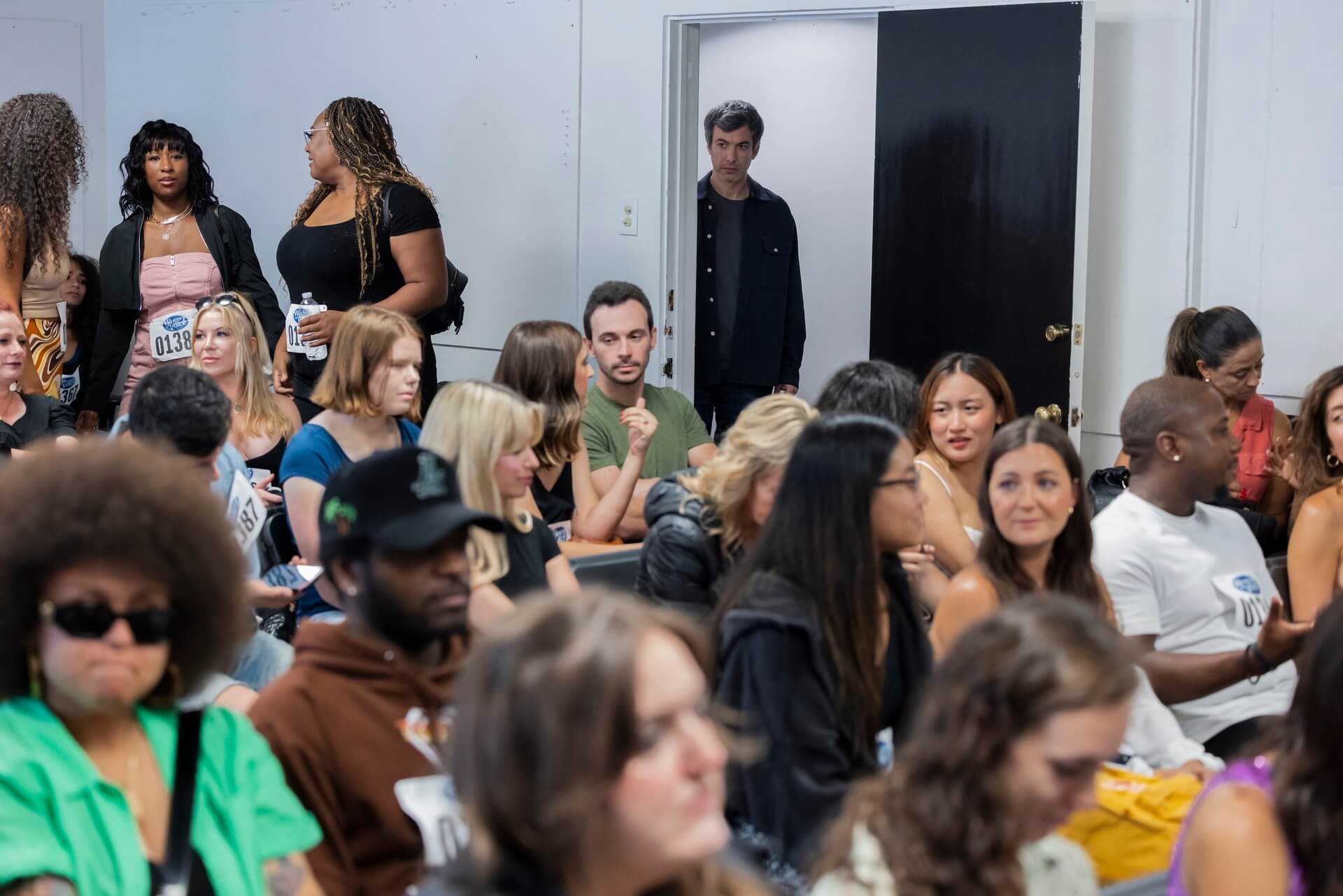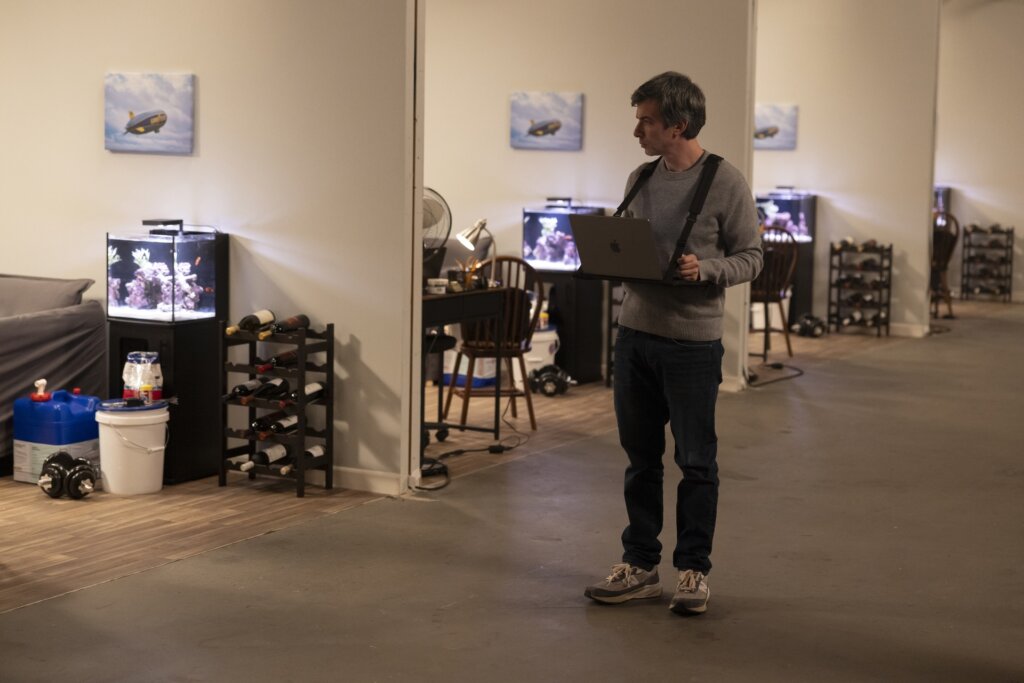In ‘The Rehearsal’ season 2, is Nathan Fielder serious?
The comedian is out to solve an epidemic of airplane crashes — will the world listen?

Nathan Fielder observes a bustling airport terminal. It’s a rehearsal — but is his aim to improve air safety an act? Photo by John P. Johnson/HBO
There’s a meme, often invoked about ambitious film projects, that “men will literally do [insert absurd undertaking] instead of going to therapy.”
In the case of Spielberg, it’s “direct a series of blockbusters that are really about his parents’ divorce.” With Werner Herzog, it’s “haul a 320-ton steamship over a hill in the Peruvian Amazon.” For Nathan Fielder, in the second season of The Rehearsal, this formula has reached its self-aware apotheosis.
Fielder would rather create a facsimile of the Houston Airport with an operational Panda Express, stage a singing competition there, craft elaborate forced-perspective sets with lactating puppets, recruit a legion of identically dressed actors to help with a commercial pilot’s love life, adopt a Tom Cruise-level commitment to performing his own stunts — and claim it’s all in the name of improving cockpit communication — instead of seeing an analyst. Fielder clearly has to work through his complexes about his own likeability, perceived insincerity and compulsion to rehearse.
Fielder’s shows are his chosen treatment, and the world is better for them. What distinguishes his exercises from other opuses of film-as-therapy is Fielder’s willingness to use himself as a guinea pig. He is, literally, doing the work, and that’s vulnerable — to a point.
In an uncanny bit of prescience, Fielder has raised the stakes in this second outing. The Rehearsal started out with the premise of preparing people for difficult life moments by staging them in advance in elaborate simulations — before it, of course, became more about Fielder than his participants. The sophomore season focuses on a subject now dominating the headlines: plane crashes. Taking a cue from experts — and possibly a chapter from Malcolm Gladwell’s Outliers — the auteur has read black box transcripts and concluded that the majority of accidents occur because first officers are too afraid of making things awkward to tell their captain that something’s wrong.
Fielder believes his HBO budget, along with the acting method he developed in the last season, can develop predictive modeling and role-playing exercises to make copilots more assertive and pilots more willing to ask for input from their second in command. But he’s anxious others will write off his work and his desire to do good.
“When you lead a life dedicated to making others laugh, in those rare moments when you want to be taken seriously, it can be difficult to overcome the deficit of credibility you’ve created for yourself,” Fielder concedes in his typical deadpan narration, over a scene of a clown pinned beneath a clown car, crying out for help as onlookers laugh. “You might think you can revolutionize aviation safety, but you can’t take that thought too seriously, because no one else will.”
Once again we return to a Fielderian theme, which boils down to a question of motive.
Last season, Richard Brody of the New Yorker stopped short of calling Fielder sadistic. Couples I know are split over whether he’s a genius or a mean-spirited exploiter of un-self-aware eccentrics. This go-around, many will surely accuse Fielder of taking advantage of performers desperate for work. No one knows for sure where Fielder the man starts and Fielder the character ends, making his true intentions impossible to pin down.
When someone with authority (well, someone acting the part of someone with authority) questions his altruism, describing his oeuvre as “pranks,” Fielder insists he has a “misunderstanding of my work.” Perhaps that authority is unaware of the millions of dollars Fielder’s outerwear brand Summit Ice — slogan “deny nothing” — has raised for Holocaust education.
Fielder is acutely aware of his reception and even his Google hits. At one point, he has a participant rank his performance. The notecard, which describes him as “very plain and monotone when talking” could have come straight from a test screening audience, and echoes notes received by his reality TV real estate developer character in Paramount+’s The Curse. (Fielder also shares that his earliest performances, as a teen magician for children’s parties, came with the critique that his body language seemed “off.”)

What’s at the crux of Fielder’s likeability and credibility complex?
While it would be overstating it to say it’s purely a Jewish thing, Fielder’s work, like Kafka’s (who would sooner write about being transformed into a giant bug than try out the new science of psychoanalysis), invites the reading. It’s secondary only to the interpretation embraced by neurodivergent viewers, who see in his dry runs at social interactions a reflection of their experience and the rehearsals used in their therapy.
As critic Tom Whyman put it, Fielder is an outsider among outsiders. In the canon of metafiction and self-insertion, he’s in the company of Paul Auster and Charlie Kaufman. Spinning insecurity and alienation into comedy is a defensive posture perfected by the diaspora Jew. But that Fielder takes the act to extremes — like one William Joel, or as I’ve argued previously, the God of Isaac Luria — may be proof that Jews are now relatively comfortable despite their difference, freed up to impose their individual issues on the larger world. Where Jews once used the humor of self-deprecation in an effort to be understood, Fielder now suggests failing to understand others is a universal condition.
Fielder’s explicit Jewishness figures in less than it did in season one, when he arranged furtive Hebrew school lessons for child actors playing his fake son, but it does arise.
Stepping into a space of his own design, Fielder rehearses a tense meeting with the German branch of Paramount+, which led the charge in removing the episode of Nathan for You that debuted the Summit Ice brand over “sensitivities” about “antisemitism in the aftermath of the Israel-Hamas attacks.”
Here too, his sincerity is challenged. The man playing the German streaming boss, briefly freed from Fielder’s direction, accuses him of not really wanting feedback or hearing a different perspective. Instead, as ever, Fielder is contriving a scenario where he’s in control and transparently in the right.
“Some people are born great performers,” Fielder later concludes. “For the rest of us, no matter how sincere we are inside, it will always be a struggle.”
As much as they address failures to communicate, these rehearsals — which any Meisner Technique teacher will tell you, come from an Old French word for “repetition” — are about Fielder’s performance anxiety in life and art.
In lieu of a therapist, it’s for us to decide just how performative he’s being.
Season 2 of The Rehearsal debuts April 20 on Max.
















